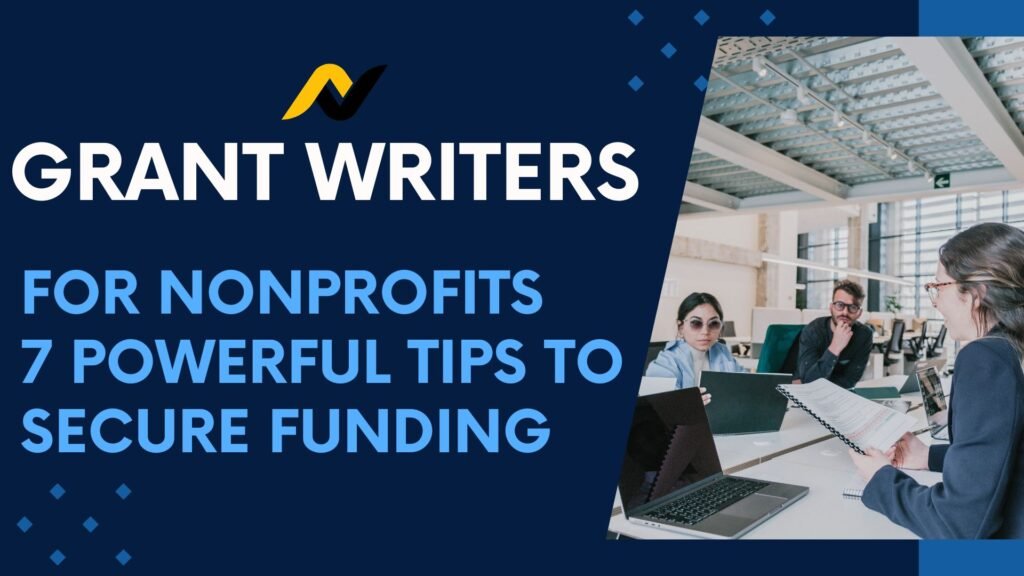Grant Writers for Nonprofits: 7 Powerful Tips to Secure Funding
Navigating the nonprofit funding landscape can be challenging, but with skilled grant writers, securing grants becomes a manageable task. This article explores the critical role of grant writers for nonprofits and provides seven powerful tips to enhance your grant writing success.
Table of Contents
Summary
This blog will explore the role of grant writers for nonprofits, emphasizing the importance of their work in securing funding. We’ll delve into seven powerful tips to enhance grant writing success, offering practical advice, examples, and an external link for further reading. Additionally, an image will be included to complement the content. Does this summary meet your approval?

Introduction
In the nonprofit sector, securing funding is a perpetual challenge. Enter the grant writer – a specialized professional whose expertise can significantly impact a nonprofit’s ability to obtain the necessary funds to fulfill its mission. But what exactly do grant writers do, and how can nonprofits leverage their skills effectively? Let’s explore the crucial role of grant writers for nonprofits and reveal seven powerful tips to enhance your grant writing success.
What is a Grant Writer?
A grant writer is a professional responsible for researching, drafting, and submitting proposals to secure funding from government bodies, foundations, and corporations. Their goal is to craft compelling narratives that persuade funders to support the nonprofit’s projects and initiatives. Grant writers play a vital role in translating a nonprofit’s vision into a language that resonates with potential funders.
Why Are Grant Writers Important for Nonprofits?
Grant writers are essential for several reasons:
- Expertise in Funding Sources: They have in-depth knowledge of various funding sources and understand the specific requirements and preferences of different grant makers.
- Tailored Proposals: Grant writers can tailor proposals to match the criteria of the funders, increasing the chances of success.
- Time Management: Nonprofits often operate with limited staff. Grant writers can manage the time-consuming process of grant applications, allowing the organization to focus on its core activities.
- Professional Writing Skills: Their ability to present the nonprofit’s case compellingly and professionally can make a significant difference in securing funding.
7 Powerful Tips for Grant Writing Success
1. Understand the Funder’s Guidelines
Before starting any grant application, thoroughly read and understand the funder’s guidelines. Ensure that your nonprofit’s project aligns with the funder’s priorities and requirements. This alignment is critical for your proposal to be considered seriously.
2. Craft a Compelling Narrative
Your proposal should tell a compelling story about your nonprofit and its mission. Highlight the problem your organization addresses, your unique approach to solving it, and the impact of your work. Use data and anecdotes to illustrate your points and make your case more persuasive.
3. Be Clear and Concise
Grant reviewers often read numerous applications. Make your proposal easy to read by being clear and concise. Avoid jargon and overly complex language. Each section of your proposal should be straightforward and directly address the funder’s questions and criteria.
4. Demonstrate Impact
Funders want to see the tangible impact of their investment. Provide evidence of your nonprofit’s effectiveness, such as past successes, measurable outcomes, and testimonials from beneficiaries. Clearly articulate how the funding will enhance your organization’s ability to make a difference.
5. Include a Detailed Budget
A well-structured budget is crucial for any grant proposal. Provide a detailed breakdown of how the funds will be used, ensuring that your financial plan is realistic and aligns with the project’s goals. Transparency in budgeting builds trust with funders.
6. Seek Feedback
Before submitting your proposal, seek feedback from colleagues or mentors. Fresh eyes can catch errors, suggest improvements, and ensure that your proposal is as strong as possible. Consider also obtaining feedback from previous funders to understand their perspective.
7. Build Relationships with Funders
Developing strong relationships with funders can increase your chances of success. Engage with potential funders through networking events, informational meetings, and regular updates on your nonprofit’s progress. Building rapport can make your organization stand out when your proposal is reviewed.
Additional Resources
For more insights and tips on grant writing, check out this comprehensive guide on grant writing that offers practical advice, templates, and examples to help you succeed in securing funding for your nonprofit.
Visit Our Website For those seeking assistance with responses, visit Narrative Nest Hub. Our team offers economical and customized response writing services that align with tenedrer specific needs and help you stand out in competitive selections.
contact us www.narrativenesthub.com
FAQs
1. What qualifications should a grant writer have?
- A grant writer should have excellent writing and research skills, attention to detail, and a thorough understanding of the nonprofit sector and funding landscape. Experience in successful grant writing is highly beneficial.
2. How much does it cost to hire a grant writer?
- The cost can vary widely depending on the grant writer’s experience and the complexity of the project. Some charge an hourly rate, while others may work on a per-project basis or on retainer.
3. Can a small nonprofit benefit from hiring a grant writer?
- Yes, small nonprofits can significantly benefit from hiring a grant writer, especially if they lack the internal resources to prepare comprehensive and compelling grant proposals.
4. How long does it take to write a grant proposal?
- The time required to write a grant proposal depends on the complexity of the grant and the specific requirements of the funder. It can take anywhere from a few weeks to several months.
5. What should be included in a grant proposal?
- A grant proposal typically includes an executive summary, organization background, problem statement, project description, goals and objectives, methodology, evaluation plan, budget, and appendices.
